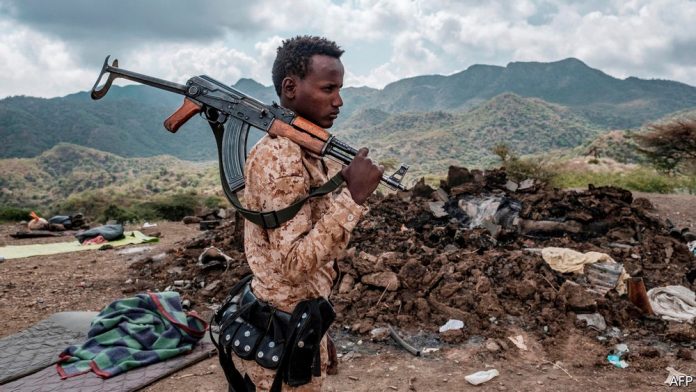Ethnic divisions have thrown Africa’s second-most-populous country into renewed conflict
BY SOME RECKONINGS Ethiopia is the oldest independent country in Africa, but it is far from united. Tensions among its 80-plus ethnic groups have been growing in recent months. And in November the country fell back into civil war. This pits the federal government against the Tigrayan People’s Liberation Front (TPLF), which controls the northern state of Tigray and until recently dominated federal politics. The danger is that the conflict will spread across Ethiopia and beyond its borders.
It is difficult to know precisely what has been happening in Tigray. A communications blackout has been in place for more than a month and versions of events are highly contested. The TPLF fired the first shots on November 4th, when its fighters attacked a base housing federal troops—to pre-empt an imminent attack from federal forces, it said. In response, Abiy Ahmed, Ethiopia’s prime minister, ordered air strikes and sent in ground forces. Hundreds, perhaps thousands, have been killed and many thousands displaced. On November 28th the government announced that it had taken the regional capital of Mekelle. It has since declared that the TPLF has been “thoroughly defeated”, and that most of its leaders have been killed or captured. But Tigray’s president, Debretsion Gebremichael, remains at large and has vowed to continue fighting.
At the heart of the conflict are fundamental ideological differences about how Ethiopia should be organised. The TPLF and Oromo opposition leaders say Abiy is trying to dilute the ethnically based federalism that underpins the constitution. They accuse Abiy of trying to undermine the autonomy of Ethiopia’s ten ethnically based states, and of centralising power. In contrast, Abiy’s supporters say he is trying to reduce the divisive influence of ethnicity in politics and to build a stronger, more united Ethiopia. Abiy frames the recent conflict as an operation to restore “rule of law” over a faction that has become too accustomed to power. Other actors may have their own agendas. Eritrea’s president, Issaias Afwerki, has no love for the TPLF. Eritrea lost a bitter war with a TPLF-led Ethiopia between 1998 and 2000 and has reportedly been helping Abiy’s forces during the recent conflict. Last month the TPLF fired rockets at Asmara, the Eritrean capital, claiming that Ethiopian troops were using its airport. Some Amhara militias, from the state to the south of Tigray, have got involved in the fighting, perhaps seeing an opportunity to settle a long-running border dispute with their Tigrayan neighbours.
The conflict thus risks further inflaming ethnic tensions in Ethiopia. At worst, the result could be the balkanisation of Africa’s second-most-populous country and the destabilising of an already fragile region. In a single day at least 600 reportedly Amhara people were massacred in Mai Kadra, reportedly by a TPLF-affiliated militia. Across the country, Tigrayans have been harassed, Tigrayan soldiers in the federal army have been disarmed and Tigrayan civil servants told not to report to work. Tens of thousands of refugees have fled to neighbouring Sudan, many reporting atrocities carried out by Amhara militias and government soldiers. Despite the news that federal armed forces have taken Mekelle, prospects for peace look bleak. Some analysts have predicted a protracted guerrilla war, with the tactics of which the TPLF’s leadership has a wealth of experience. A convincing TPLF defeat, on the other hand, might embolden Abiy to centralise more power. His supporters may hope to see a new federal arrangement, perhaps a revised constitution, but it is unclear whether this would bring lasting peace.
Source: The Economist





























